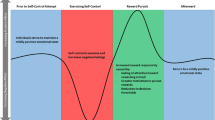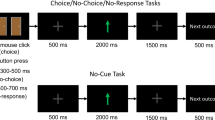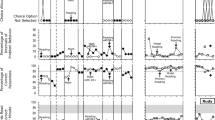Abstract
The effect of external and self-administered reward on high base rate behavior was examined. The investigation involved three periods: baseline, reinforcement, follow-up. Four experimental conditions were run: no-reward control (n =10), self-administered reward (n =10), external reward (n =9), and external control (n =10). During the first two sessions, fifth- and sixth-grade male and female children were placed alone in a free-play room with four toys. During Sessions 3 and 4, subjects were assigned to one of the four conditions. During Sessions 5 and 6, all subjects were again placed in a free-play situation. Using a repeated measure analysis of variance, evidence for an overjusticication effect for the external reward condition was found.
Similar content being viewed by others
References
Bem, D. J. (1972). Self-perception theory. In L. Berkowita (Ed.),Advances in Experimental social psychology (Vol. 6) New York: Academic Press.
Brownwell, K. D., Colletti, G., Ersner-Hershfield, R., Hershfield, S. M., & Wilson, G. T. (1977). Self-control in school children: stringency and leniency in self-determined and externally imposed performance standards.Behavior Therapy, 8 442–455.
Deci, E. L., & Ryan R. M. (1980). The empirical exploration of intrinsic motivational processes.Advances in Experimental Social Psychology, 13 39–80.
Dollinger, S. J. (1979). Extrinsic rewards, reward-associated messages, and intrinsic motivation.Cognitive Therapy and Research, 3 367–370.
Fazio, R. H. (1981). On the self-perception explanation of the overjustification effect: The role of the salience of initial attitude.Journal of Experimental Social Psychology, 17 417–426.
Feingold, B. D., & Mahoney, M. J. (1975). Reinforcement effects on intrinsic interest: Undermining the overjustification hypothesis.Behavior Therapy, 6 367–377.
Goldfried, M. R., & Merbaum, M. (Eds.), (1973).Behavior change through self-control. New York: Holt, Reinhart, & Winston.
Kanfer, F. H. (1973). Self-regulation: Research, issues, and speculation. In M. R. Goldfried & M. Merbaum (Eds.),Behavior change through self control. New York: Holt, Rinehart & Winston.
Lepper, M. R., & Greene, D. (1975). Turning play into work: Effects of adult surveillance and extrinsic rewards on children's intrinsic motivation.Journal of Personality and Social Psychology, 31 479–486.
Lepper, M. R., Greene, D., & Nisbett, R. E. (1973). Undermining children's intrinsic interest with extrinsic reward: A test of the “overjustification” hypothesis.Journal of Personality and Social Psychology, 28 129–137.
Mynatt, C. R., Oakley, T., Arkkelin, D., Piccione, A., Margolis, R. B., & Arkkelin, J. (1978). An examination of overjustification under conditions of extended observation and multiple reinforcement: Overjustification or boredom?Cognitive Therapy and Research, 2 171–177.
Reiss, S., Sunshinsky, L. W. (1976). The competing response hypothesis of decreased play effects: A reply to Lepper and Greene.Journal of Personality and Social Psychology, 33 233–244.
Rosenfield, D., Folger, R., & Adelman, H. F. (1980). When rewards reflect competence: a qualification of the overjustification effect.Journal of Personality and Social Psychology, 39 368–376.
Stunkard, A. J., & Mahoney, M. J. (1977). Behavioral treatment of the eating disorders. In H. Leitenberg (Ed.)Handbook of behavior modification and behavioral therapy Englewood Cliffs, NJ: Perentic-Hall.
Author information
Authors and Affiliations
Additional information
This paper is based on the first author's doctoral dissertation at Bowling Green State University. Many helpful comments and suggestions were made by the committee members, especially Kenneth Shemberg. David Dye, Tom Thalman, Sharon Kevesdy, and Pam Rader helped to run the study. The authors are most appreciative of this assistance.
Rights and permissions
About this article
Cite this article
Margolis, R.B., Mynatt, C.R. The effects of external and self-administered reward on high base rate behavior. Cogn Ther Res 10, 109–122 (1986). https://doi.org/10.1007/BF01173387
Issue Date:
DOI: https://doi.org/10.1007/BF01173387




